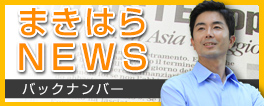Macky’s Profile
| June 1971 | Born in Tokyo |
|---|---|
| March 1990 | Graduated from Azabu Senior High School in Tokyo |
| November 1994 | Passed the National Bar Examination |
| March 1995 | Graduated from Tokyo University, Law Department |
| March 1995 | Began the judicial training course at the Legal Training and Research Institute |
| April 1997 | Registered as a practicing attorney and joined the Asahi Law Offices in Tokyo |
| May 2001 | Graduated from Georgetown University Law Center (LLM) |
| June 2001 | Studied at the Law Division of the World Trade Organization (WTO) in Geneva |
| September 2001 | Joined Hogan & Hartson LLP in Washington, D.C., specializing in governmental regulations and international trade |
| August 2002 | Joined Asahi Law Offices (formerly MASUDA & EJIRI) in New York |
| September 2002 | Registered as an attorney in New York State |
| September 2003 | Joined the Japanese Ministry of Economy, Trade and Industry (METI), Trade Policy Bureau, Multilateral Trade System Department |
| September 2005 | Elected to the House of Representatives from Saitama District No. 5 • Became a member of the Committee on Economy and Industry • Became a member of the Special Committee on privatization of the Postal Office |
| December 2005 | Deputy Director of the Youth Division, Deputy Director of the Women Division, Deputy Director of the Newspaper Division, Vice Chairman of the Group on Finance, Monetary and Securities |
Macky’s Hobbies
- Travel (visited more than 60 countries)
- Playing sports (especially tennis)
- Watching sports
- Movies
- Reading (favorite book is “Ryoma ga iku” by Ryotarou Siba)
Who is Macky?
I’m a lawyer. I consider myself not only a Japanese attorney, but an international attorney. While I was working as an attorney in Japan, I focused on corporate law and international disputes. I also took cases dealing with such things as securities, finance, anti-trust, intellectual property rights, overseas development assistance, labor, and bankruptcy. And I worked on criminal defense, stalking, sexual harassment, loan sharking, family law, and civil cases.
After I studied in the U.S., I worked on behalf of Japan in various international fields. While specializing in international trade law, I worked on cases in which Japanese companies were involved in IPR, coerced labor, and securities issues.
I returned to Japan in 2003 and worked in Ministry of Economy, Trade, and Industry’s Multilateral Trade System Department. While there, I was in charge of WTO disputes and FTA negotiations. I devoted myself to trade issues that are the lifeline of the Japanese economy.
Originally, I wanted to become a politician. But I became a lawyer because I wanted to work for social justice. My experience as a lawyer has made a significant contribution to my policy views.
I’m a policy activist. It’s important to not only think of solutions, but act on them. While I studied in the U.S. and at the WTO, I had many discussions with young and ambitious people from around the world about public policy and international politics. Through these discussions, I began to think about the future of Japan from an international point of view. I held and/or participated in various study groups for young professionals. We discussed many issues, such as Japan’s falling birth rate and aging society, national security, public safety, social security, economic policy, the environment, human rights, financial reform, and taxes. Through these discussions, I gained expertise on many issues. I would like to continue these discussions with the people in my constituency.
We should not make policy just based on theory, acting is also important. I try to experience things myself, go to the place myself, and listen to people myself.
Based on my expertise, understanding, international point of view, long-term view, and activism, I would like to create policies for the future of Japan and then implement them.
I’m an ordinary person. I’m a new style politician without the “3-bans” — ” ji-ban” a strong local support group, “kan-ban” recognition, and “ka-ban” money. These “3-bans” are considered necessary for Japanese politicians. However, I do not have any of these. I also don’t have any relatives who are politicians or wealthy. My father worked for one company for many years and is now retired. My mother is stay-at-home mom and does volunteer work for sight-impaired people. My parents devoted their lives to raising their children and never thought of themselves. Since I was raised by such parents, I am the same way.
Because I don’t have conflicts, I consider it an advantage. I am willing to work for Japan, the Japanese people, and for the future of Japan.
I am concerned about children, animals, nature, and minorities. I love children and I am determined to do whatever it takes to let children have dreams. Also, animals are weak in human society. It is unbearable for me that many dogs and cats are killed at animal shelters. Finally, I believe nature is the mother of all of us and the source of our life and hearts. But she has been harmed. If we lose what we have inherited from our ancestors and parents, we may lose what it means to be “Japanese.” Therefore, I want to protect nature so that we can give it to our children.











